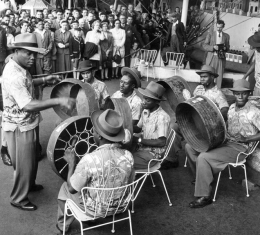The following, which pays homage to steelpan great Earl Rodney, was written by Zahra Gordon and published in The Trinidad Guardian Newspaper, June 25th, 2013.
At the peak of his solo career, musician and arranger Earl Rodney was travelling frequently between the UK, the US and Trinidad performing at various events. Since 2008, he’s been based in Trinidad and has remained largely out of the public eye.
According to Rodney, travelling was rough and a well-deserved break was needed. The 75-year-old Point Fortin-native has spent a lot of time working on his garden, finishing his home, and generally relaxing.
This does not mean, however, that he’s given up music. During an interview with the T&T Guardian last week at his home in Point Fortin, Rodney said he is still learning.
“I keep playing all the time. I’m improving. Everyday I go on my pan and find out things I didn’t know before. It’s like you’ve never seen the pan before. I haven’t reached a bottleneck yet. It’s like out there (pointing to the sky), there’s no end.”
A few more “outings” are turning up for Rodney this year, however. During Carnival he performed at a Trinbago Unified Calpysonians Organisation (TUCO) event and in May was featured in the Point Jazz concert as part of Borough Day celebrations. Last weekend he was also the featured artist at the birdsong Benefit Concert held at the National Academy for the Performing Arts (NAPA). Working with birdsong, Rodney has been introduced to young musicians whom he can envision future work with. Making a connection with real musicians, who have both talent and dedication is a rare occasion, according to Rodney.
Although Rodney said he’s able to bridge generational gaps, he doesn’t see himself fitting in with today’s local music industry.
“All over the world there’s a downgrade in music. You go to England you’ll hear the same complaints. In between there’s some good ones that could last a few years,” he said. “But these people who are into the Carnival thing, I wonder if they can remember the Road March or the Soca Monarch from last year. I hate to say that and I wish I didn’t have to say it. People used to sit down to write and arrange music for people to dance. It’s a different time and these people are enjoying their time, but for me, the music isn’t going anywhere.”
His disappointment with the industry will not stop him from producing. He has a few projects under his sleeve. He hopes to build a studio and has the scores of numerous compositions waiting to be recorded piled up at home. He also wants to work on scores for film or theatre as this is one area in his vast career that he has yet to venture into.
Rodney may best be known for his winning Panorama arrangements for Solo Harmonites and his work on iconic calypso music. As a member of the Troubadours he arranged seven albums for the Mighty Sparrow. He has also arranged and played with Lord Kitchener, Arrow, Black Stalin, Valentino, Lord Melody and Explainer, to name a few. Although Rodney has worked extensively in calypso, he admitted that his favourite genre is Latin.
“Almost everything I do has a little Latin in it,” he said. Rodney shared that while growing up in Point Fortin, it was Latin music that filled nightclubs.
Rodney is also remembered for his 1972 recording Friends and Countrymen. He has recorded two other solo albums: Steelband Music (1999) and Pure Original Music (2002). Rodney said he has all intentions of recording another album and developing new methods to record live steelband music, which can often be difficult.
“We need a good way to capture pan and I don’t know how come we haven’t come up with one yet,” he said.
His formula for longevity and the large body of work come from an undescribable source, he said.
“For me it’s not a labour really because most of my compositions just come to me. Sometimes I do sit down and manufacture something, but other times it just comes from nowhere. I’ll be watching TV and just hear music in my head. These things are magical. Music for me is a natural thing.”
Earl Rodney was co-founder of Tropical Harmony Steelband and a former member of the T&T National Steelband. He was also a bass player in the band Dutchy Brothers during the 1960s and 70s. As arranger for Solo Harmonites, the band won four Panorama titles.For the original post:
At 75, more still to come from Rodney | The Trinidad Guardian Newspaper.





